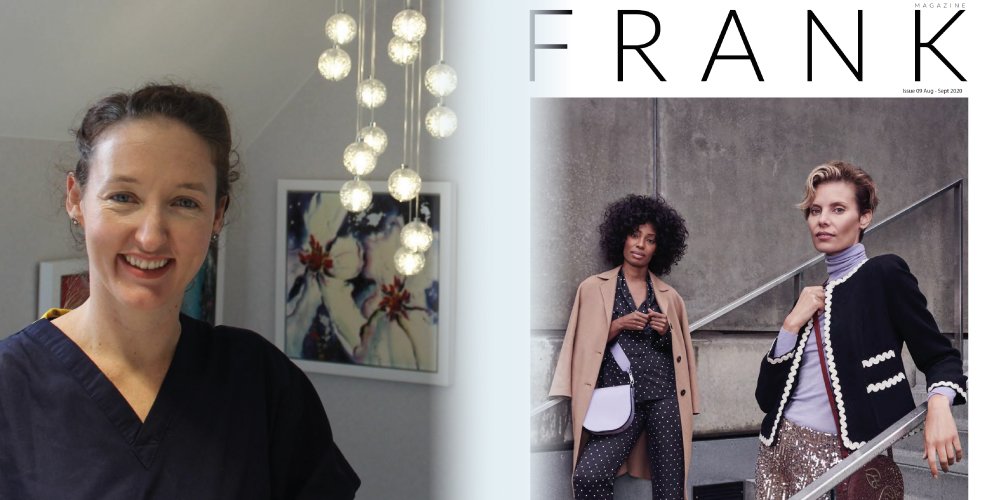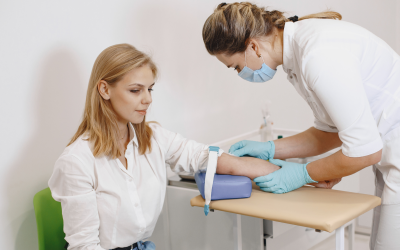As Featured in Frank Magazine, October 2020 Issue: https://thefrankmagazine.com
Dr Caitlin Scott is a qualified GP from Cape Town, South Africa. After graduating from The University of Cape Town she gained over four year’s experience in hospital and private general practice. This is where her passion for women’s health developed. Her experience as a doctor and a mother of two has been invaluable in understanding the demands of women and their need for good health. Since moving to the UK and working at The Iron Clinic, she has established a wealth of experience in intravenous iron therapy to patients of all ages.
She has grown her experience of women’s health promotion through running courses to help new mums navigate their own physical, emotional and social transition into motherhood. The program includes recovering physically from pregnancy and child birth, post natal depression, understanding your changed relationship with your partner and coping with returning to work. Her interest in women’s health spans all age groups and she hopes to extend her health promotion through to include understanding your menstrual cycle and menopause.
Dr Caitlin Scott currently manages inquiries into intravenous iron therapy at The Iron Clinic and forms part of the consulting team at the Harley Street clinic. She is also participating in a number of research projects looking into the symptoms of anaemia and iron deficiency.
Where does your passion for women’s health come from?
It started in a tiny contraceptive clinic room in South Africa. I was struck by the number of women that were ushered in and out, in a robotic manner, without any control or participation in the decisions that were made about their reproductive health. I became passionate about educating women about their bodies. About their menstrual cycle and about fertility. I felt that in empowering women with information about the way that their body works, that they would then be in a far better position to understand why they felt the way that they did and why that changed through the weeks of each monthly cycle. The mood changes, breast changes and changes in the consistency of the cervical fluid. As women, our body gives us physical signs of how it is coping. As my experience in women’s health increased, I wanted to gain a deeper understanding of all stages of a women’s life and help women to navigate all of those changes as comfortably as possible.
What is it about this field that excites you?
I was feeling frustrated at not being able to help and support women who were essentially trying really hard and still feeling sub optimal. Medicine teaches us how to manage disease and disorder but has little space for optimising wellbeing and how to recognise and manage
the symptoms linked to hormonal and nutritional imbalance. After spending some time in Levitas Clinic Guildford and consulting with patients already under the Bio Identical Hormone service, I realised how content, well and fulfilled their lives were. I wanted to learn all that I could about it and to be able to offer that contentment to my patients. The more I
learnt about hormones, the more I began to appreciate how beautifully our body works and how important it is for it to remain in balance. It is not about the individual hormones but rather about how they are working in relation to one another. Hormonal depletion in both men and women can start as early as 30 and is linked to the effects of ageing both internally and externally. It is also about understanding the signs and signals that our body gives us when it is out of balance.
Menopause must be a fascinating area as although there are of course common themes everyone’s experience is different?
It is fascinating to walk a path with a patient because each patient is different. Each of the hormones tend to show certain signs when they are out of balance but the combination or pattern can be very different in each patient. This is why The Mews started the Bio Identical Hormone service with an hour long initial consultation. We create this background picture to get as best an understanding of the impact of the symptoms as possible and then match that up to the blood test results to know what needs balancing. We need to sift out all of the ways in which the body has responded to hormones from puberty, contraceptives, periods, pregnancy and as the levels of hormones begin to decrease. The Mews are unusual in that we approach hormones in a holistic manner. In addition to bringing balance to hormones we like to extend that into all aspects of health, thereby treating the whole person. There is greater benefit to the patient when the hormones are in perspective of overall health, as all factors can contribute towards how someone is feeling. The hour initial consultation followed by ongoing follow ups allows the clinician to get an understanding of the symptoms that patient is experiencing and will play a large part in the treatment offered. Bio-identical hormones are compounded and can therefore be prescribed taking all factors such as the general health, symptoms and the results from the blood test into account.
What sort of treatments do you offer?
The Mews offer a Bio Identical Hormone service that looks to balance out the hormones according to the symptoms and blood results at the time of the consultation. By Bio Identical we are referring to creams, lozenges or tablets that contain a bespoke prescription for the hormones that are deficient in your body. Those hormones are prescribed in the same shape and form that your body makes them so that they function in the same way that your body intends them to. The service is an ongoing journey that starts with an initial consultation, blood tests and a pelvic ultrasound and includes regular follow ups with blood tests to review the progress. It is a supported journey that we walk with you. We explore extraneous factors such as adrenal stress and vitamin depletion which may impact on the balance of the hormones and address these so as to maximise the benefit from a holistic service which gives the best possible outcome for a patient.
What sets the clinic apart from other menopause clinics?
At Levitas Clinic Guildford, it is all about the patient. I am encouraged to give each patient the time that they need and I have, at my fingertips, all of the treatments and support to make them feel better. We walk the path with the patient and support them each step of the way. The Mews also works as an integrated team so that each patient benefits from the expertise of all of the staff. The time and attention that I am encouraged to give to each patient is unique and speaks straight to the heart of the way in which I have always wanted to practice medicine. The Mews can also fill in the gaps with nutritional therapy which can often bring great benefit to patients. We know that stress reactions can disrupt hormones and we can address root causes as well as the consequences.
What is their/your ethos in tackling the issues around menopause?
The Mews ethos is to treat an individual and have a comprehensive focus. We take the time to get to know the patient and to try to understand the impact of the symptoms on their quality of life. We then apply the interpretation of the blood results to what we have understood as the troubling symptoms, to compile a bespoke management plan to balance the hormones and treat the symptoms. Each consultation is unique and is what the patient requires.
What are the most common questions and complaints about peri- menopause/menopause?
The majority of women come in to see us because they are feeling low – low in energy, low in mood and low in libido. There are many different causes of these symptoms and it is, therefore, important to exclude nutritional deficiencies that may be contributing. The biggest complaints are that health professionals pass off these symptoms as being ‘in their head’. Most women feel that they are not being heard and that their concerns are not being addressed.
It’s really only in the last few years that the very natural stage of a woman’s life is getting ‘air time’ Why has it almost been a taboo subject until recently?
I think that it is similar to many other female topics. Periods, post partum issues, pre-menstrual tension, Endometriosis, Polycystic Ovarian Syndrome and sexual wellbeing were notoriously poorly managed. I think that women need not feel that they should hide the physical and emotional effects of hormones and are becoming more bold in sharing their experiences. What so many have discovered is that they are not alone in their suffering. What is more, is that they do not have to suffer and that there is something that can be done to soften the transition.
What is your advice to women when they start to feel differently?
I tell each of my patients that they know themselves the best. They know what their normal feels like and the way that they normally respond to stress and pressure. That means that they are in the best position to know when something is not right. Go in to your doctor and tell them what you are feeling that is out of keeping with how you usually feel. Ask them to check your bloods for nutritional deficiencies, organ dysfunction and hormonal imbalance. Ask them for a copy of your results. If you don’t feel that you have been heard then ask for a second opinion. The common symptoms that women describe are low or reactive mood, anxiety, headaches, bloating, low libido, fatigue, low energy, hair loss or reduced hair quality and breast tenderness.
If you are seemingly sailing through the menopause, manageable hot flushes, not having a rollercoaster of emotions etc should you still be tested for hormonal imbalances and should you still tackle that?
Many symptoms develop gradually over time and we often only recognise them once they have become severe enough to impact our quality of life. Modern life often becomes a reason for the symptoms e.g. working hard, young families etc. Women therefore tend not to seek help and get used to a new normal rather than aspire to optimum wellbeing. Practising health optimisation means that we take the time to look for those minor first glimpses, recognise them and address them to maintain health and wellbeing. Whilst treating symptoms for patients is important, the ethos at The Mews is to empower women to have the tools to live more full lives and feel the very best without accepting a mediocre existence as normal.




